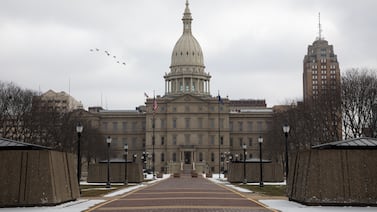Votebeat is a nonprofit news organization reporting on voting access and election administration across the U.S. Sign up for Votebeat Texas’ free newsletter here.
After considering a number of bills that would significantly reshape election administration and voting access in the state, Texas lawmakers ultimately approved only a few, including legislation that would alter the schedule of the 12-day early-voting period to increase access.
They also passed measures aimed at reducing rejections of mail-voting applications and ballots, and added new restrictions on curbside voting, but held off on some more controversial proposals.
Among the bills that didn’t advance were Senate Bill 16, one of Lt. Gov. Dan Patrick’s priority bills, which would have imposed a strict requirement for voters to provide documentary proof of citizenship, and a measure that would have given state Attorney General Ken Paxton more authority to prosecute election crimes. Bills that would have permitted online voter registration, audits of hand-count results, and guns in polling sites also stalled.
Here’s a look at the election bills discussed during the latest legislative session, and how they turned out:
Texas is set to expand early voting, a change that could delay partial preliminary results
Legislation that expanded early voting had evolved considerably before its passage. The bill as initially drafted would have banned vote centers, a model offered by some counties where voters can cast ballots at any polling place in the county. The proposal prompted pushback from counties that said vote centers save taxpayers millions of dollars and make voting more convenient.
After a series of changes, Senate Bill 2753 became “a compromise,” said the bill’s author, Sen. Bob Hall of North Texas. The bill retains the required 12-day early voting period, but starts it later, and eliminates a three-day gap between the end of early voting and Election Day.
That schedule gives voters an extra weekend of access to early voting. And the bill requires that voting be available for nine hours on Sundays, instead of six, and that voting be open on any holidays during the early voting period.
But the changes mean that partial vote tallies from the early ballots, which are typically released shortly after polls close on Election Day, won’t be available until later, when all polling locations have closed and reported tallies. That could push total results later, election administrators told Votebeat.
Some election officials said the changes would require hiring additional election workers to work longer hours, as well as more voting equipment and possibly additional polling locations. Counties would have to cover those costs, as the state didn’t allocate additional funding.
The bill directs the Texas secretary of state to consult with counties and report to the Legislature on whether they are prepared to implement the changes by August 2027.
Voting by mail will get a little easier with new processes for handling errors, more legible instructions
After Texas’ overhaul of election law in 2021, which created new ID requirements for voting by mail, more voters across the state saw their mail-ballot applications or ballots being rejected because of errors.
The 2021 law created a process for voters to correct errors on mail ballot applications and to track online whether the application has been received and processed. This year’s legislation was meant to refine that process.
Senate Bill 2964, by Sen. Bryan Hughes, a Republican from Central Texas, will allow election officials to call and email voters to notify them of errors before their application or ballot is processed, and it allows voters to correct the errors by mail or in person.
Lawmakers also approved a bill requiring the instructions on a vote-by-mail application to be printed in larger type, to make them more legible for people with disabilities and elderly voters. House Bill 2259 also requires the application to be available in various languages, “appropriate to the demographic composition of this state.”
Both bills were approved with bipartisan support and are set to take effect in September.
Curbside voting will be more restricted
Under current law, if a voter is “physically unable to enter the polling place,” the voter can ask that an election worker bring a ballot to the entrance of the polling place or to a car parked at a designated spot. The law requires all polling sites to offer such curbside voting.
In the past year, some election officials noticed more voters using curbside voting. When state Rep. Ryan Guillen, a Republican from South Texas, filed House Bill 521 this session, he told the House Committee on Elections that he was concerned about potential misuse of the practice.
HB 521 now requires anyone using curbside voting to sign a form swearing under penalty of perjury that they are unable to enter the polling place without personal assistance or a likelihood of injuring their health.
In addition, as a check against potential misuse, the bill requires election officials to ask anyone providing transportation to a user of curbside voting whether they have done so for multiple voters. The transportation provider will need to sign a form, with their name and address, stating that they are assisting a voter.
Failing to fill out such forms will be a Class A misdemeanor, punishable by up to a year in jail or a fine of up to $4,000.
Proof of citizenship won’t be required to register to vote in Texas
SB 16 was among the most sweeping proof-of-citizenship proposals for voters introduced anywhere in the country, applying not only to new applicants for voter registration but also retroactively to 18.6 million voters on the rolls. Voting rights advocates warned that the bill would disenfranchise eligible voters, and discourage future voters by making registration and voting more burdensome.
But SB 16 and its companion in the House missed a key deadline and died without a full House vote. The legislation’s Republican sponsors, Hughes and Rep. Carrie Isaac of Central Texas, did not respond to requests for comment about why the bill, a key Republican priority, didn’t get a floor vote.
Attorney general is denied broader powers to prosecute election crimes
Paxton’s office won’t gain new powers to prosecute election crimes, after the House and Senate failed to work out their differences on how much leeway to grant the state’s top legal official in such cases.
House Bill 5138 was filed by state Rep. Matt Shaheen, a Republican from North Texas. The Senate passed a version that would have given the attorney general’s office the power to unilaterally prosecute local election crimes when a county declines to do so. The House had previously agreed to grant Paxton’s office more powers to prosecute such cases, but only after local prosecutors considered the case.
Similar bills were also filed in 2023 after the Texas Court of Criminal Appeals, the state’s highest criminal court, found Paxton’s office does not have authority to independently prosecute criminal election cases in trial courts without the request of a local prosecutor. Those bills also failed, and the House that year voted to impeach Paxton on misconduct allegations that included bribery and abuse of office. The Senate later acquitted Paxton.
Texas won’t offer online voter registration
Texas lawmakers held their first hearing in a decade on legislation that would allow people to register online to vote and revamp the state’s current paper-based system. But the legislation, House Bill 311, filed by Rep. John Bucy of Austin, missed key deadlines and failed to move forward. At least five similar bills filed this session by Democratic lawmakers did not even get committee hearings.
Counties can keep mailing out unsolicited voter registration applications
Lawmakers filed bills to prohibit counties from sending out voter registration forms to people who didn’t request them, and bar the use of state money to support such mailings by other groups. Senate Bill 511, championed by Sen. Paul Bettencourt of Houston, passed the Senate but failed to meet key deadlines in the House.
The measure was filed in response to moves by two Democratic-led counties to mail out voter registration forms to hundreds of thousands of residents, unsolicited. In each county, only a small share of applications were returned, but the effort sparked a backlash. Bettencourt said the mailings could make it easier for ineligible people to register and cast ballots.
No guns allowed in polling locations
Bills that would have allowed poll workers to carry concealed handguns inside polling places, or allowed anyone to carry a concealed weapon inside a polling location, stalled. The bills, House Bill 1128 and House Bill 1794, were championed by Isaac and Rep. Carl Tepper, also a Republican, but failed to meet key deadlines to move forward.
Hand-counted ballots still can’t be audited without a full manual recount
For ballots that are tabulated electronically, Texas law requires partial recounts to check the accuracy of election results. But there’s no provision requiring such audits for ballots counted by hand. In fact, under current law, such audits are possible only through a full manual recount.
The risk of that became clearer when Gillespie County Republicans hand-counted thousands of ballots during the March 2024 primary, rather than using electronic tabulators. The group made multiple errors, and the results were never verified.
Rep. Ellen Troxclair, a Republican whose district includes Gillespie, filed House Bill 3113, which would have made it easier to verify the results by requiring a ballot design that allowed for electronic tabulation. The bill received support from poll workers and election officials across the state, including Gillespie County’s elections administrator, but was left pending without a vote in the Senate.
Correction, Sep. 8, 2025: An earlier version of this story misidentified the bill restricting curbside voting. It is House Bill 521, not 511.
Natalia Contreras is a reporter for Votebeat in partnership with the Texas Tribune. She’s based in Corpus Christi. Contact Natalia at ncontreras@votebeat.org.



